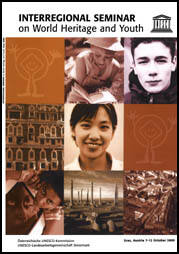International Workshop on World Heritage Education - Austria
Graz, Austria, 7-12 October 2000
Interregional Seminar on World Heritage and Youth
The workshop consisted of 3 working groups that focused on different aspects of the World Heritage Education. The first working group was "Challenges in Introducing World Heritage Education into classroom teaching and trough extra-curriculum activities"; the second group was working on the "Assessment of the World Heritage Education Kit" and the third group tried to come up with "Innovative Approaches in World Heritage Education".
Workshop objectives
The objective of the workshop was to gather World Heritage and education experts in order to exchange their experiences gained on the progress of the World Heritage Education Project and to identify steps for its continued development.
Workshop Results
1. Educational Policy level:
- Establishment of a national task force (including young people and communities), as the integration of World Heritage Education in national curricula is indispensable for a successful implementation of World Heritage Education
- Teacher education and training in World Heritage Education must be intensified
- World Heritage courses should be introduced at universities as a further education level.
2. Didactic implementation:
- The Kit should be published in the native language in order to guarantee its widespread use in schools.
- It would be very helpful to teachers to have standardized presentation formats of World Heritage sites and to have access to data through both national and UNESCO databases.
- Accompanying material such as videotapes, CD-ROMs, photographs, transparencies etc. would facilitate the implementation.
- In popularity ranking of subjects, the sections on Environment and Tourism have proved to be most popular with schools, followed by the sections on Identity and Culture of Peace. The section on the World Heritage Convention places last, thus, the didactic models appear to be difficult to implement.
- New and supplementary subjects proposed were: World Heritage, human rights and ethic issues; World Heritage and sustainable development; World Heritage and intangible heritage (especially in Africa); and personal heritage and World Heritage.
- Many participants advocated adapting the subjects to different age levels, especially pre-scholars and primary school children (addition of games, cartoons, etc.).
- World Heritage Education is excellently suited to the use of new technologies; a CD-ROM version of the Kit would be helpful, key e-mail addresses should be included in the annex.
- Integrating World Heritage Education in Flagship Projects was considered a positive development.
3. Requests to UNESCO
- Participants called for increased promotion of international co-operation by way of Flagship Projects, such as twinning projects, ASP Network Schools Adopt Monuments, etc., on the part of UNESCO
- Heritage projects and peace projects should be linked in conflict areas.
- Recognition awarded by UNESCO to projects organized by young people would be incentive to their implementation.
- Targeted co-operation with national institutions and field offices should be enhanced.
- World Heritage Education should be rooted more strongly in the World Heritage Committee.
- Participants called for more resources and continuous development of the Project within the scope of UNESCO programs.
Organizers
The Austrian National Commission for UNESCO
The UNESCO Association Styria
UNESCO
Participants
37 World Heritage Education experts from 32 countries
Countries represented
Austria, Bolivia, Bulgaria, Croatia, Czech Republic, Ecuador, Gambia, Germany, Israel, Italy, Kenya, Kosovo, Latvia, Malawi, Morocco, Norway, Oman, Palestinian Autonomous Territories, Portugal, Russian Federation, Slovenia, South Africa, Sweden, Thailand, Turkey, Uzbekistan, Vietnam and Zimbabwe.
